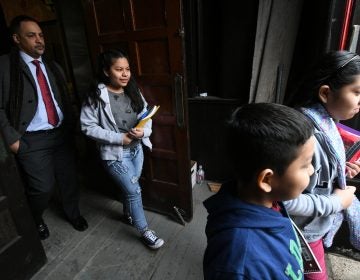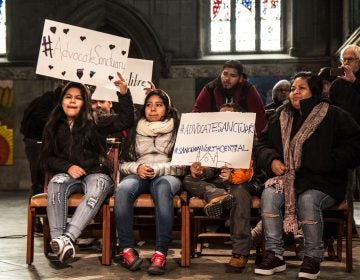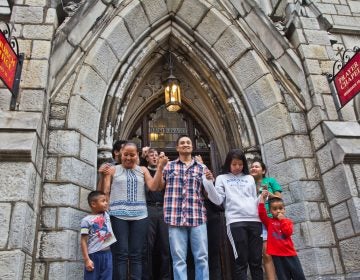Two more families choose sanctuary in a Philly church over separation, deportation
U.S. Immigration and Customs Enforcement has a policy of avoiding arrests in “sensitive locations,” which include houses of worship.
Listen 2:37-

The Thompson family who moved to the U.S. from Jamaica to escape threats from gangs has lived in South Jersey for 12 years. Oneita and her husband Clive received deportation notices, they moved into sanctuary at the First United Methodist Church of Germantown. (Kimberly Paynter/WHYY)
-

Jeison, 2, son of Suyapa Reyes, was born in the United States. (Kimberly Paynter/WHYY)
-

Suyapa Reyes moved to the U.S. from Honduras about five years ago. Her son Jeison, 2, was born in the and is a citizen. After receiving a deportation notice, Reyes and her son, and other children took sanctuary at the First United Methodist Church of Germantown. (Kimberly Paynter/WHYY)
-

Suyapa Reyes and her children take sanctuary at the First United Methodist Church of Germantown. (Kimberly Paynter/WHYY)
-
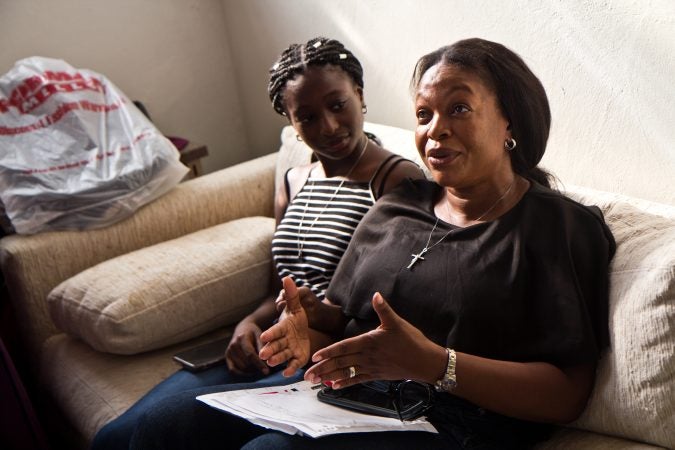
Oneita Thompson talks about her faith in Jesus. Thompson and her daughter Christine, 15, and their family are living in the sanctuary at the First United Methodist Church of Germantown. (Kimberly Paynter/WHYY)
-
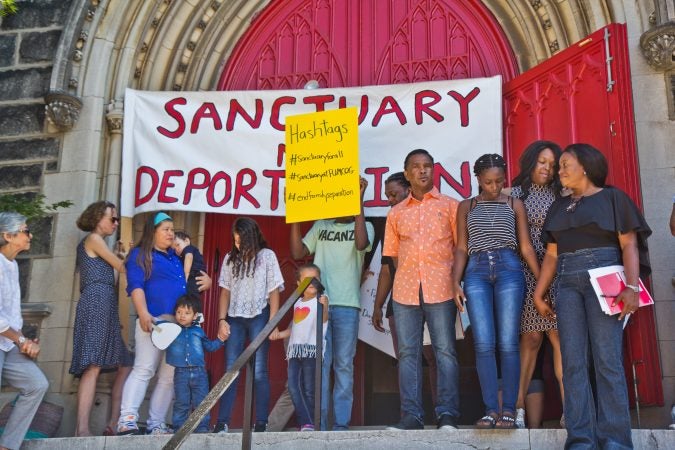
The Thompson and Reyes families take sanctuary at the First United Methodist Church of Germantown. (Kimberly Paynter/WHYY)
-
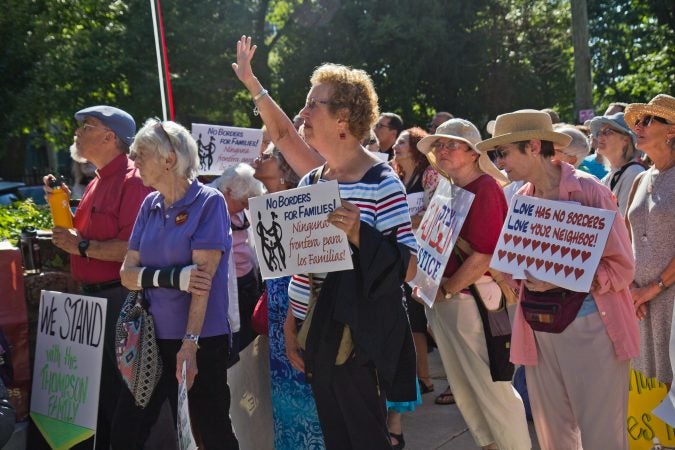
Members of the First United Methodist Church of Germantown’s congregation gather to support the Reyes and Thompson families. (Kimberly Paynter/WHYY)
-
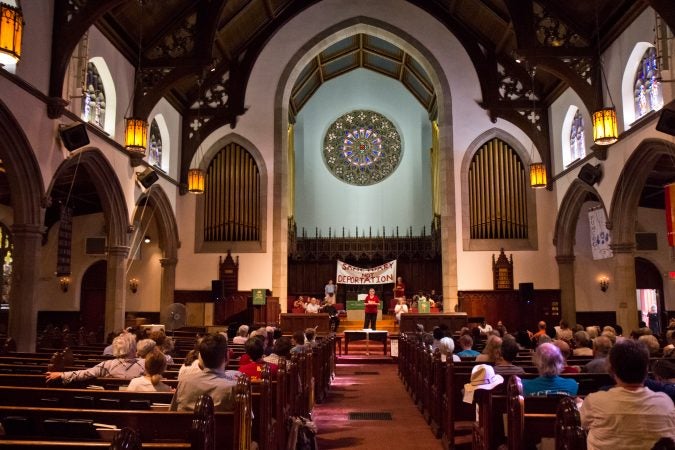
Members of the First United Methodist Church of Germantown’s congregation gather to support the Reyes and Thompson families. (Kimberly Paynter/WHYY)
For several months during 1984, a family who had fled violence in Guatemala hid out from immigration enforcement in the First United Methodist Church of Germantown.
Last Tuesday, two more families followed in their footsteps, entering the same imposing stone building on Germantown Avenue without knowing when they would be able to move freely again.
They joined the growing number of immigrants in Philadelphia and the U.S. who choose to take sanctuary in churches and other religious buildings, rather than accept deportation and threats of violence in their home countries. Carmela Apolonio Hernandez and her four children have been living at Church of the Advocate in North Philadelphia since mid-December 2017 to avoid deportation to Mexico after their application for asylum was denied.
U.S. Immigration and Customs Enforcement has a policy of avoiding arrests in “sensitive locations,” which include houses of worship. Immigrants who choose to stay in the churches enter what is essentially self-incarceration to make use of this policy.
Suyapa Reyes, 37, fled Honduras five years ago and applied for asylum in the United States. She lost her case, and afterwards ICE was keeping tabs on her family through biweekly check-ins for several months before telling her that she would have to leave.
“[The ICE agent] told me I had to leave behind my kids who were born here” when she left the country, said Reyes. The idea of putting them in foster care was unimaginable. “There’s no one they could stay with here. I’m their mother and father,” she said.
ICE spokesman Emilio Dabul said the agency “cannot comment regarding the Reyes [case] due to pending legal issues.”
Instead, she and four of her children, Jennifer, 13, Yeimi, 7, Jeison, 2 and Junior, 10 months, packed their belongings into a van and moved into a Sunday school classroom in the First United Methodist Church of Germantown, which goes by the acronym FUMCOG, with the help of the New Sanctuary Movement, a Philadelphia immigrants rights organization.
“I feel happy here. I feel protected here. I feel like no one is going to separate me from my kids,” said Reyes.
The prospect of family separation also loomed over the Thompsons.
Clive and Oneita Thompson came to the United States in 2004 from Jamaica, after gang members killed Oneita’s brother and burned her family’s farm. That same year, they applied for asylum, a process that can take years. In the meantime, they put down roots in Cedarville, New Jersey, working as a machine operator at Cumberland Dairy and nurse assistant at a retirement community in Woodstown.
They also raised five children who all have legal grounds to stay in the U.S.: two are U.S. citizens, one is a permanent resident, and two are beneficiaries of Deferred Action or Childhood Arrivals or DACA program. However, in 2009 the couple lost their case for asylum, and they lost a subsequent appeal a couple of years later. Federal immigration authorities allowed Clive and Oneita to stay and work legally, under what’s called an order of supervision, until about a month ago, when they got word they needed to buy one-way tickets to Jamaica.
Clive said they bought the tickets, but couldn’t bring themselves to use them.
“For us to go back, it would be very dangerous,” he said. “Where would we go, after giving up all that we have here? I think that is injustice.”
They own a home, cars, and have been paying taxes and working with authorization. If Clive and Oneita leave without their kids, they could be barred from returning for ten years. The couple, along with their two youngest children, Christine, 15, and Timothy, 12, both U.S. citizens, now occupy a former dressing room for the church drama group, sharing the space with a string of blue school lockers.
ICE spokesman Emilio Dabul provided this statement about the Thompsons’ case:
“Oneita Thompson and Clive Thompson, both Jamaican nationals, overstayed their terms of admission to the U.S. by nearly 14 years. In September 2009, an immigration judge ordered them removed from the country. The pair appealed their case all the way up to the 3rd Circuit Court of Appeals, which dismissed their petition for review. ICE has granted them numerous stays of removal to allow them to make arrangements to depart the U.S., but even so, they failed to depart. They are currently immigration fugitives and subject to arrest and removal from the country once encountered by ICE.”
The two families settled into the church for about a week before going public, speaking to reporters and supporters on the church steps Wednesday morning. The Rev. Bob Coombe welcomed about 60 supporters into the church’s nave for a brief service. Both families are continuing to apply for a legal path to stay in the U.S. Reyes has applied for a visa available for victims of crime who cooperate with the police, called a U-visa.
Providing sanctuary and the advocacy it entails has also thrust FUMCOG back into the spotlight, said Coombe.
“I initially went into it thinking it was more passive, but to see their passion and the significance of having public presentations [about sanctuary] I think is really helpful,” he said.
WHYY is your source for fact-based, in-depth journalism and information. As a nonprofit organization, we rely on financial support from readers like you. Please give today.


